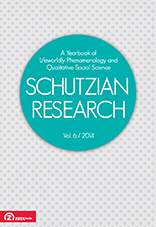The “Well-Informed Citizen” as a Theory of Public Space
The “Well-Informed Citizen” as a Theory of Public Space
Author(s): Michael HankeSubject(s): Philosophy
Published by: Zeta Books
Keywords: well-informed citizen; public sphere; communication society; information flow; relevance
Summary/Abstract: Alfred Schutz´ article on the well-informed citizen can, among others, also be read as a treatise on the information flow in democratic society. To be “well-informed” is a challenge the citizen has to keep up with in order to play his role in civil society, and being well-informed is also to be seen as a precondition for a fairly functioning political community. For Jürgen Habermas, it is the free press that guarantees public communication of democratic societies and which is threatened by the colonisation of the life-world by system constraints following capitalistic logic. The systems nowadays threatening the life-world have additionally become digital in nature, questioning the traditional division of public and private, whereby the challenge of the well-informed citizen set up by Schütz has not lost any relevance nor contemporary interest. On the basis of Schutz´ framework, these questions are debated in the context of Habermas´ Structural Change of the Public Sphere, Volker Gerhardt´s theory of the Public Sphere, and Vilém Flusser´s analises of the new telematic digitalized society.
Journal: Schutzian Research. A Yearbook of Lifeworldly Phenomenology and Qualitative Social Science
- Issue Year: 2014
- Issue No: Volume 6
- Page Range: 93-103
- Page Count: 11
- Language: English
- Content File-PDF

